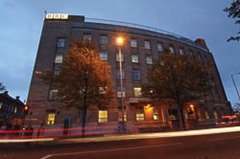Meet the media: John Campbell
 BBC Northern Ireland’s Economics and Business Editor, John Campbell, discusses the state of the economy and the changing nature of media work. John studied journalism at Sheffield University before working on the Liverpool Echo and as a producer with the BBC in Belfast.
BBC Northern Ireland’s Economics and Business Editor, John Campbell, discusses the state of the economy and the changing nature of media work. John studied journalism at Sheffield University before working on the Liverpool Echo and as a producer with the BBC in Belfast.
How did your interest in journalism come about?
It’s always been there. I can remember writing football reports for my primary school yearbook back in Ballymena when I was about 10 or 11.
I think the clincher was when I got to visit the Ulster Herald in Omagh on press night. Just seeing all the frenzied activity and hearing the roar of the presses made me think: “This looks like a cool job.”
How has your career developed to date?
I started at the Liverpool Echo as a general reporter and business reporter. I was then lucky enough to get onto the BBC regional trainee scheme in Bristol. From there, I was placed in Belfast and until this time last year I was essentially a producer working across TV, radio and online. It was quite a big step at this stage of my career to go for an on-air role but I’m glad I made the leap. I’m eternally thankful to my colleague Julian O’Neill for encouraging me to do it.
Who inspires you?
People who can write really clearly and insightfully about complicated issues.
That includes John Lanchester and Donald MacKenzie on the London Review of Books and John McDermott on the FT.
How has the media changed since you started working in it?
When I started in Liverpool there was one internet-enabled computer in the newsroom. You had to fill in a form and hand it in to the news desk to get permission to use it. So the technological side has been revolutionary. It has made us faster, more responsive and more accountable but it has also financially damaged essential parts of the news-gathering infrastructure in a way that is very troubling.
What stories stand out as the most significant?
The collapse of Mivan was a major one. It was such an iconic brand that there was a degree of shock among many people that this could have happened. It illustrated the long shadow that’s been cast by the property and construction bubble.
 What is your overall assessment of covering business in Northern Ireland?
What is your overall assessment of covering business in Northern Ireland?
I think it’s become a bit easier to get business and economics issues featured. Firstly because we’re no longer in an era of intense ‘peace-processing’ so there is room for other stories. Secondly, the great recession and its aftermath is a fascinating story which audiences want to hear about.
One of the main frustrations is that there can still be a guardedness among some business owners. People may be running very successful and interesting businesses that we would love to feature as case studies in some of our reporting but the thought of appearing on camera appears to terrify some people.
How do you see the economy developing over the next year?
I see investment by businesses sustaining the recovery over the next year helped by growth in the Great Britain and Republic of Ireland markets but in other areas, things are more concerning. Real wages are flat or falling so I don’t see that consumers are going to be spending a whole lot more.
The biggest issue locally is what is happening in the public finances. The welfare reform issue is a bit of a sideshow to an increasingly tough spending environment – which is only going to get tougher after the next election. The public sector is such a dominant part of the economy here that there will be knock-on effects both in terms of consumption by public sector workers and among companies which work for the public sector. And then there are a whole host of external unknowns stretching from Scotland to Syria.
What is the most satisfying part of your job?
It’s when people tell me: “I understand that now.” My main aim is to try to cut through intimidating jargon and technical language and spell out to a general audience the significance of a particular economic development. When I achieve that, I’m happy.
Do you see any business trends or stories that are under-reported by the media?
Some of the big economic trends which are reshaping society and don’t necessarily lend themselves to a two-minute TV piece or a 500-word article are probably under-reported.
For example, the massive rise in self-employment. There was an interesting infographic from Centre for Cities which suggests that all the net jobs growth in Northern Ireland in 2013 was due to self-employment. Why has that trend developed and what are its long-term implications?
What do you do to relax?
Gym, cooking and reading.





